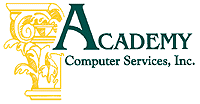
| Company | Products | Support | Ordering | Contact Us | ||
|
CD Tower and Virtual CD Tower
Email Us
©2001 Academy Computer Services, Inc.
|
Networking Client / Server
In the real world of client/server networks this commonly means a PC running the Novell NetWare or Microsoft NT operating system (server), one or more Microsoft Windows 9x/NT workstations (the clients) using the networking features of the server operating system (the common language), and a Network Interface Card (NIC), RJ-45 UTP cabling, and a hub (the transmission media). Each workstation is used as a fully functioning PC, but the user can make requests to the server for access to data, folders, drives, or printers not physically attached to the workstation. Client/Server networking is best suited for larger networks; usually of 10 PCs or more. The benefit of a client/server network is the high security control that is possible. Specific users of the network may be permitted of denied access to particular network devices or data. And unlike peer networks, if many users are accessing the same information the PC/server will not slow down (as much). The network environment was designed for multiple users and a greater amount of across-the-network activity. Caveat Emptor. A client/server network is more complex to setup and administer than a peer network and is generally not a do-it-youself project. Novell NetWare
It uses TCP/IP and a propritary protocol (IPX) to communicate. The PC that runs the server OS must have at least 64 MB RAM, a 1GB hard drive, and a NIC. Novell has created a series of couses with in-depth instruction about the NetWare OS. Students may choose from several different course tracks to achieve different certificates. The certificate for sucessful completion of the most comprehensive courses (and passing the exams) is called the Certified Novell Engineer. Microsoft NT
It uses the TCP/IP protocol to communicate. The PC that runs the server OS must have at least 32MB RAM, a 500MB hard drive, and a NIC. Microsoft has created a series of couses with in-depth instruction about the NT OS. The certificate for sucessful completion of these courses (and passing the exams) is called the Microsoft Certified Systems Engineer.
|
|